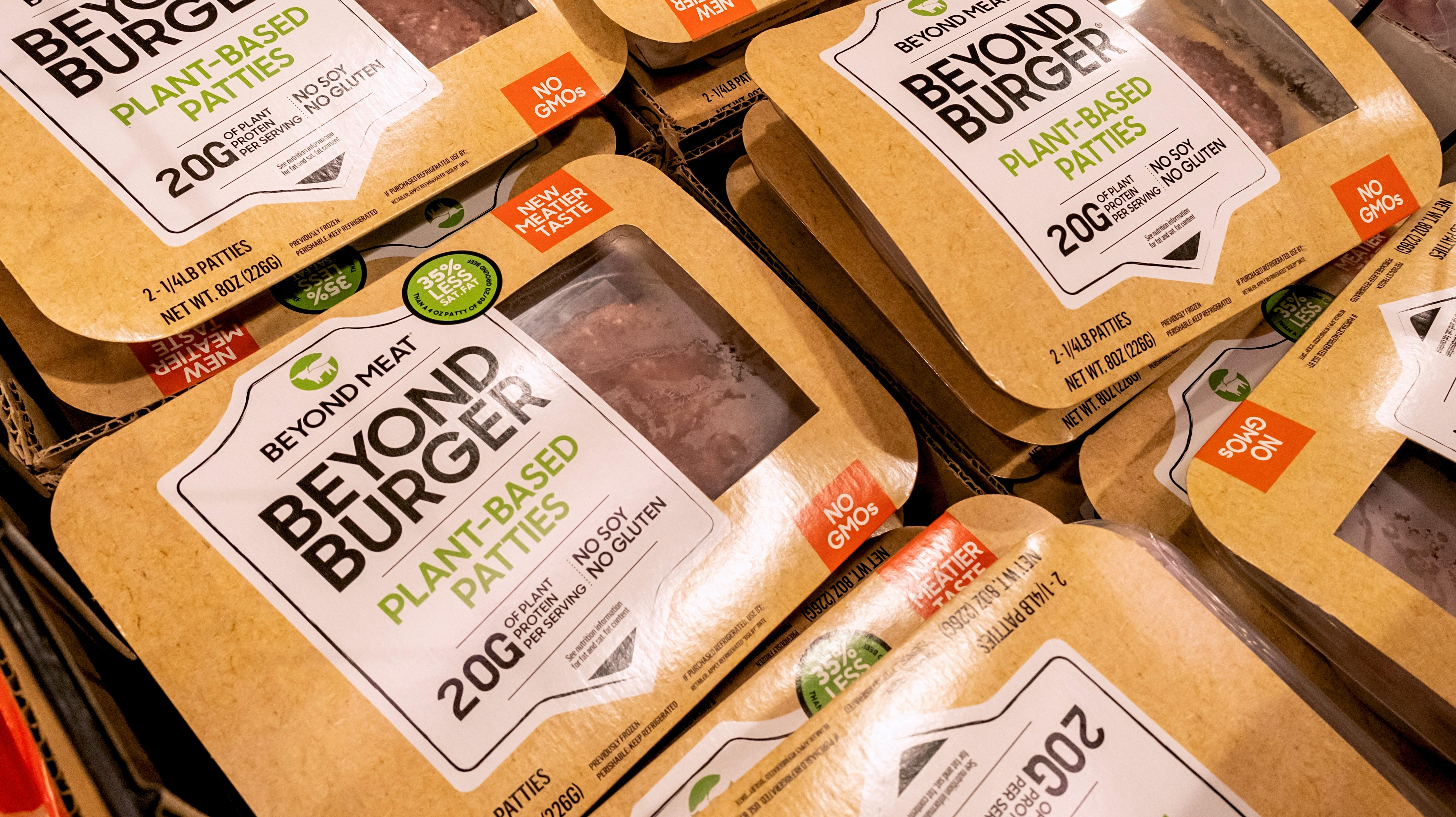Why Doesn't Beyond Meat Fast Food Ever Last?
A brief look at the rise of Beyond Meat and its current state as a big-name meat alternative.
In the world of plant-based meat alternatives and the trendy brands that sell them, two major players come to mind: Impossible Foods and Beyond Meat. While both vegan "meat" companies have made strides in helping to grow the availability of vegan options on the market, recently it seems like the latter of the two brands might be struggling to deliver: Both the stock price and multiple quiet rollouts of Beyond Meat fast food products could indicate challenges for the brand.
A brief history of Beyond Meat
Beyond Meat, founded in 2009, actually started off with a failure, reported CNBC in 2019. Chicken strips were the plant-based meat company's first product, which launched in 2012 and helped get the brand into major grocery store chain Whole Foods. However, negative reviews from food critics, combined with the success of the brand's burger patties eclipsing the chicken strips, were enough to lead Beyond Meat to discontinue the initial product.
Since then, Beyond Meat has redeemed itself by introducing superior chicken tenders in restaurants. However, even then, the chicken tenders did not come without some struggle. Bloomberg reported in 2021 that the brand struggled to bring the product to market due to some internal issues involving both the formulation and uneven rollout of the tenders.
On the bright side, Beyond has also had plenty of celebrity endorsements, which have likely helped the brand expand its lineup of products from chicken tenders and burger meat to ground meat, sausage, meatballs, and jerky. This product expansion has also led to a number of partnerships with fast food chains and restaurants, which is where Beyond Meat finds itself now—and it's where other issues appear to have cropped up.
Beyond Meat’s adventures in fast food
In February 2021, Beyond announced a partnership with Yum Brands, owner of fast food chains KFC, Pizza Hut, and Taco Bell. Beyond Meat was set to create a number of new meat alternatives for each of the chains. None of these have been a roaring success in terms of development and launch.
For KFC, Beyond Meat developed Beyond Fried Chicken, a product that basically consisted of plant-based nuggets but which were carefully not described as nuggets for some reason. Regardless of the name, this "chick'n" product took three years to debut nationwide, yet did not earn a spot on the permanent menu, ending the rollout after a couple months. (Maybe it will come back again soon?)
Beyond Meat's collaboration with Pizza Hut followed a similar route. Starting off with a limited-time offering of Beyond Italian Sausage Pan Pizza that was successful enough to lead to a pepperoni option, it seemed as though this plant-based offering would stick. Tests of the Beyond Italian Sausage began as early as 2020, but all of Pizza Hut's Beyond Meat offerings were gone by March of 2021. Once again, there's no guarantee those offerings won't return, but regardless, these collaborations feel notably brief.
In addition to its lackluster ongoing partnership with Yum brands, Beyond Meat also collaborated with McDonald's for the chain's plant-based burger, the McPlant. Unfortunately, this plant-based patty did not seem to hook customers in its limited testing phase. McDonald's ended its test of the McPlant this month and gave no indication of plans to launch it nationwide.
Beyond Meat at Taco Bell
Even more recently, Taco Bell looks to be developing its own proprietary plant-based option. As part of its original partnership with Yum Brands, Beyond Meat created a vegan carne asada for the Taco Bell menu. That item never went national, though both Taco Bell and Beyond Meat have consistently emphasized that their partnership is ongoing, and some sort of plant-based product(s) is still in the works.
"Creating something innovative and delicious takes time," Missy Schaaphok, Director of Global Nutrition & Sustainability at Taco Bell, told The Takeout via email. "We bring care and consideration to every new venture, and we're excited to be partnering with Beyond Meat to introduce an industry first new plant-based protein before the end of 2022."
Additionally, however, Taco Bell has begun testing its own proprietary plant-based protein made from a soy and pea-based blend, reports CNBC. Schaaphok says Taco Bell has been working on this proprietary meat alternative for many years. Because of that, the timing of this in-house plant-based product's debut doesn't necessarily point to dissatisfaction with Beyond Meat; Taco Bell is simply doing both.
Beyond Meat is obviously still the leading player in the plant-based meat market (consistently outperforming Impossible), and as Schaaphok notes, menu development can be a long, slow process. But as more consumers embrace these meat alternatives, there's not only an increase in demand, but an increase in demanding customers: With so many players entering the game to compete with the leading brands, there's no room for substandard flavor. To draw in flexitarians (the target demographic for any plant-based brand), the only option is to consistently deliver on great taste at a palatable price point.
